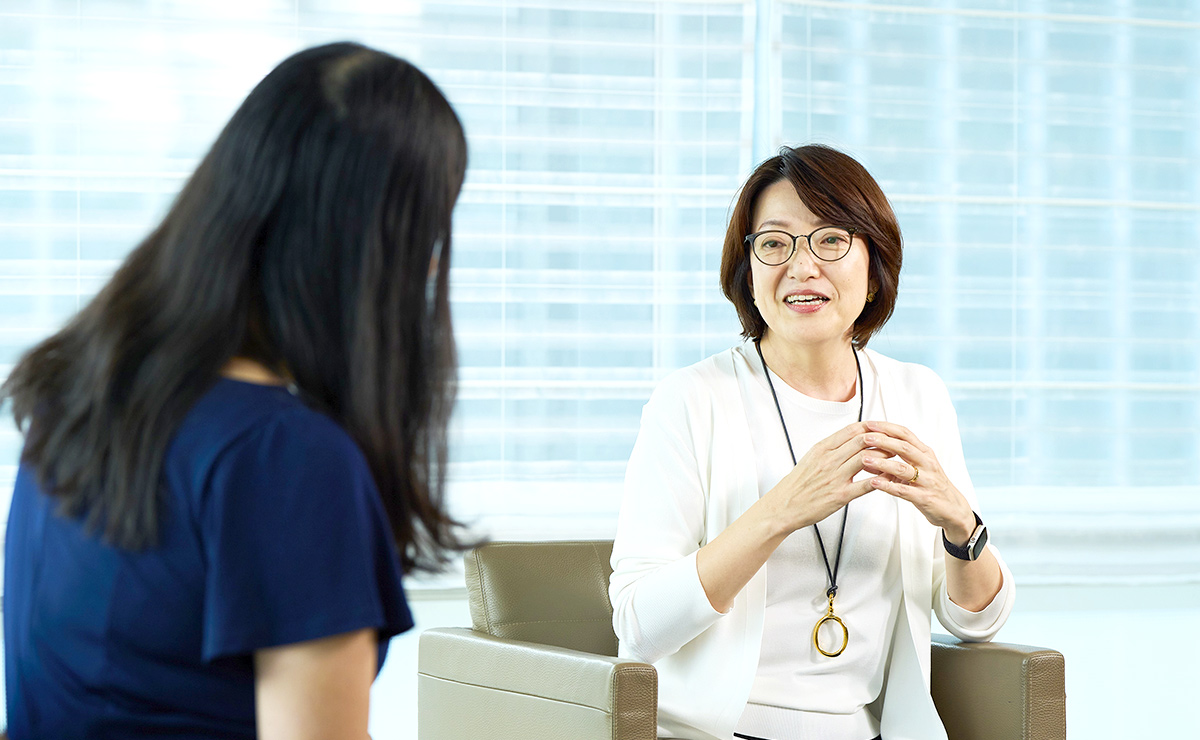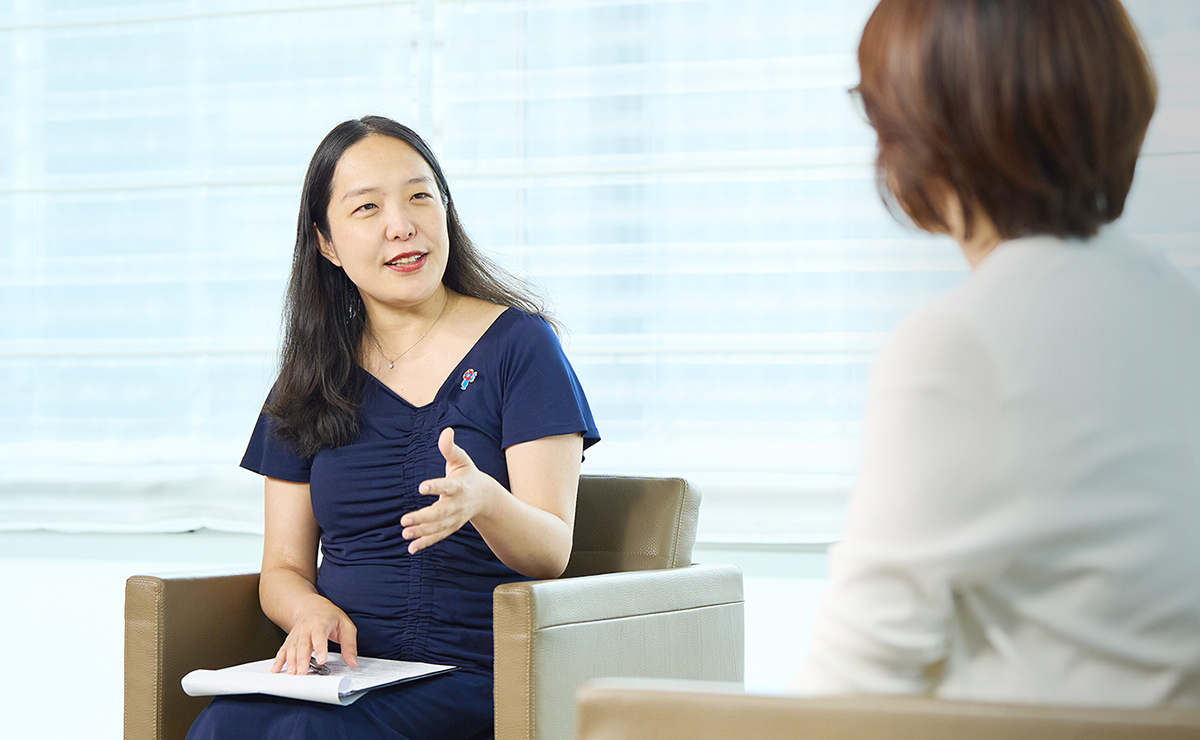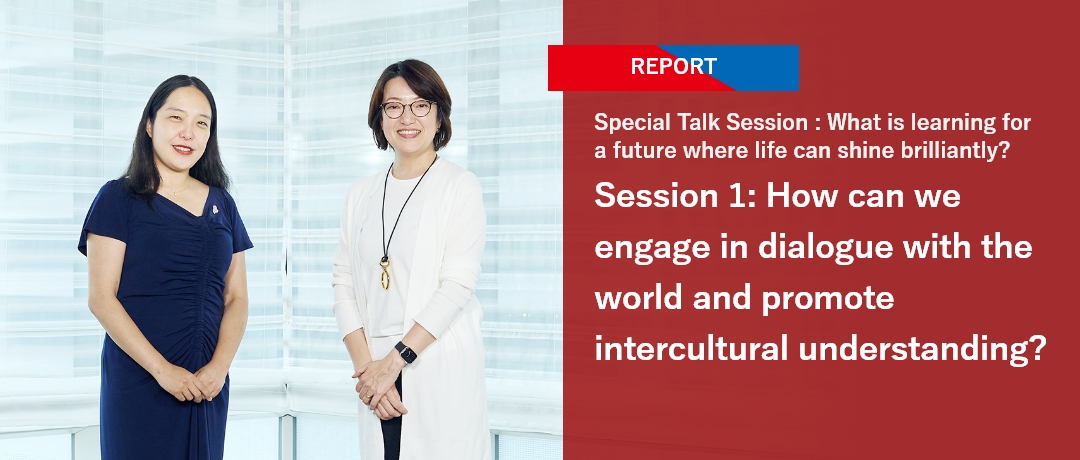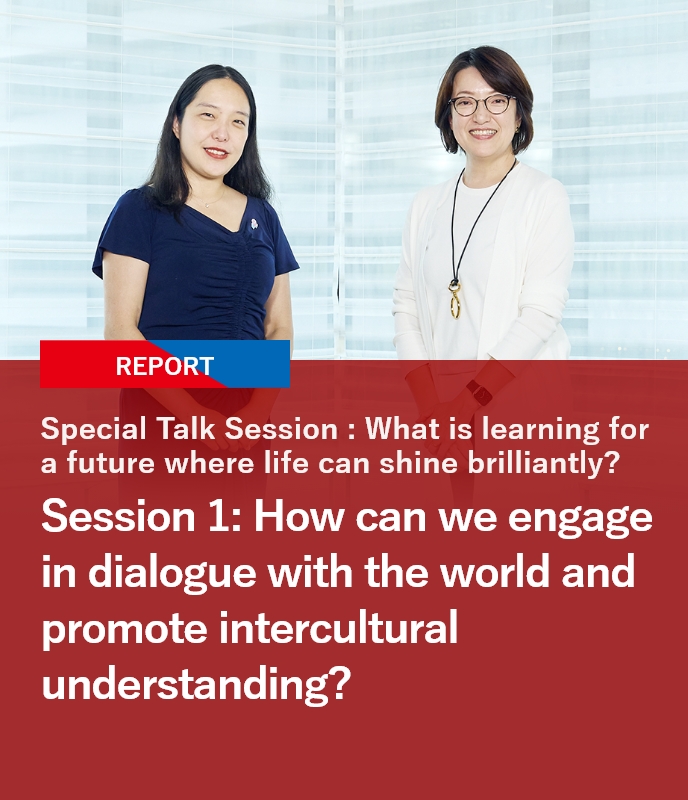The theme of World Expo Osaka-Kansai 2025 is “Designing Future Society for Our Lives.” What shape should learning take so that young people and children who will become our future leaders can shine? As a Thematic Project Producer for World Expo Osaka-Kansai as well as an educator, mathematician, and musician, Sachiko Nakajima wears many hats. She served as the navigator for this expert talk session on the topic of learning for a future where life can shine brilliantly. For this first talk session, Nakajima spoke with Dr. Miki Horie, a Professor in the College of Global Liberal Arts at Ritsumeikan University and the Principal of Ritsumeikan Primary School, on the topic of engaging in dialogue with the world and promoting intercultural understanding.
Profile
Sachiko Nakajima
Nakajima earned her bachelor’s degree from the Department of Mathematics of the School of Science at the University of Tokyo. In her second year of high school, she became the first Japanese woman to win a gold medal at the International Mathematical Olympiad in India. She took a liking to piano and composition at an early age and began her music career in earnest during university. In 2017, she founded steAm Inc. to promote the widespread adoption of STEAM education. She serves as one of the Thematic Project Producers for World Expo Osaka-Kansai 2025.
Miki Horie
Horie earned her bachelor's degree from the Faculty of Education at Nagoya University and her master’s degree from the Graduate School of Education at Nagoya University. She earned her Ph.D. in Educational Policy and Administration (Comparative and International Development Education) from the University of Minnesota in the United States. After teaching at Nanzan University and Nagoya University, she joined Ritsumeikan International in 2009. In 2017, she was appointed as the Representative Principal of the Ritsumeikan Primary, Junior, and Senior High Schools, a post she held concurrently with her professorship at the university. In 2021, she was named the Principal of Ritsumeikan Primary School, and in 2023, she joined the College of Global Liberal Arts as a professor.
The "brilliance of life" means you can do what you love
Nakajima: I have loved math and music ever since I was a child, and I also work to promote STEAM education* while continuing to pursue these activities. Given my background, I was asked to serve as a Thematic Project Producer for World Expo Osaka-Kansai focusing on the topic of education. The overarching theme of World Expo Osaka-Kansai 2025 is “Designing Future Society for Our Lives.” First of all, Dr. Horie, could you please tell us your thoughts on what is meant by "the brilliance of life" ?
Horie: I heard that when you were in junior high school, you spent an entire month thinking about a single math problem. I think this is an exact reflection of what is meant by "the brilliance of life." It means being able to pursue your own curiosity and interests. I also think it means being accepted by those around us for having this kind of attitude.
Nakajima: Do you mean being accepted for being our unique selves?
Horie: We all have things we are good at and things we are not good at, and sometimes we have to do things we don't feel like doing in the course of going about our lives. But I think it would be nice to have a society with spaces where your own interests are valued.
Nakajima: People often ask me why I do this or that, but I think it is important to have room to aimlessly play around without any purpose or to let yourself get totally absorbed in something before you realize it. That being said, don’t you think there are many people who have trouble finding something they like?
Horie: Students often consult with me about this. As an onlooker, I can see there are things they like or things they are good at. They are already doing them unconsciously; they just haven’t come to the realization yet. That is why it’s good to receive feedback and encouragement from those around you with phrases like “You sure are good that that” or “That’s impressive.”
* STEAM education is a method of learning that engages students in using creative thinking to come up with questions and solve problems by studying Science, Technology, Engineering, the Arts, and Mathematics in a cross-disciplinary manner.
The diversity of “brilliant life” that shines though from mutually respectful dialogue
Nakajima: Regardless of whether you are a child or an adult, you may think you know yourself, but you do not. Just as you become aware of the good qualities of Japan only after going abroad, it is possible to learn about yourself by encountering others who are different from you.
Horie: You cannot relativize yourself on your own, so encountering others with different values and behavioral patterns is the best mirror. Therefore, I encourage young people to immerse themselves in places where their commonly held beliefs do not apply at all. When I studied in China at the age of 20, I felt something liberating, like I was able to accept my true self.
Nakajima: If you have only one axis, you end up comparing yourself with others, but when you are exposed to many axes, you realize that it’s oaky to have your own axis. In this sense, what do you think is important for learning where life can shine brilliantly?
Horie: To ensure that your individuality and your own life force is protected, others must also be protected. You need to be valued, and so do others, and this requires dialogue. Speak your mind, and if you make a mistake, you can admit it and correct it. I think dialogue can only proceed in a mutually forgiving relationship.
Nakajima: When we talk about topics such as gender and race, you run into some sensitive areas. So, are you saying it is more important to show each other how you feel, rather than to focus on what is right or wrong?
Horie: For example, let’s say there is a number "6" between me and you. When I look at it, it looks like a “6,” but from your point view, it looks like a "9." If I continue to insist that it is a “6,” then the exchange is not constructive. I believe that what leads to learning is understanding that there are many ways of looking at things, and then devising ways to come to terms with them based on that understanding .
Nakajima: As with anything, if you change the conditions, you can see a whole different world and take a more flexible approach to grasping the essence of something. I think the world would be very different if we were taught how to learn this way in school.
Horie: Public education is inevitably uniform in some respects, but I think it is wonderful that everyone has an equal opportunity to learn the same content. That being said, I agree it can be hard to take your learning to a level beyond that. Researchers are currently studying and analyzing various learning styles, one of which is referred to as "individually optimized learning.” Some children prefer to learn in the traditional sense, by listening to lectures, but others prefer to read on their own, and still others want to learn through physical activity. If we can adopt these various approaches to learning in a well-balanced manner, I think students will be able to learn in a way that suits them, which will allow them to develop self-esteem more easily.

Learning mechanisms to make students realize that it ultimately “comes down to the individual”
Nakajima: I think the students of the College of Global Liberal Arts, where Dr. Horie teaches, have many opportunities to encounter the world. What kind of experiences do your students have when they actually come into contact with different cultures?
Horie: The students in the College of Global Liberal Arts, where I teach, encompass a range of nationalities, each with its own cultural and linguistic background. Whether students can truly learn from each other, however, will depend on the learning mechanism you employ, so I believe that my role is to create that mechanism. For example, in one class, I asked all the students to give a presentation on their educational history while teaching them about educational theory. What we found is that, even among Japanese students, each demonstrated different patterns in terms of their educational backgrounds, so everyone had a completely different story to tell.
Nakajima: That is interesting. A student may have thought of another classmate as their friend, but with this exercise, they were exposed to that person’s own background and values. It seems to me that you have created mechanism that allows students to realize that even Japanese people are diverse in their own ways and that it’s not just a matter of having a different nationality.
Horie: That's right. In terms of diversity, it’s fine to start with things that are easy to understand. But ultimately, it comes down to the individual. I hope that students will develop the ability to lead their lives with an understanding that each individual is diverse and that there are other kinds of diversity in society that are not easy to see.
Nakajima: I hope that adults who live in a segmented environment will also consciously adopt such learning mechanisms and devices, so we can transform our society into one that is easy to live in and where everyone's life shines brilliantly.
Horie: I think mechanisms for connecting individuals with each other are very important. By caring about and understanding the person in front of you, you can add one more layer of diversity to your repertoire. It seems to me that the healthy way to understand diversity is to see it as an accumulation of individual acts like these.

A place where everyone can learn about other cultures with peace of mind as equals
Nakajima: Now that I am working on the World Expo project with various people whom I would not have met otherwise, I have come to realize that it all comes down to individual characteristics. I am in charge of the "Invigorating Lives" thematic project for the World Expo, and we decided to name our pavilion Playground of Life: Jellyfish Pavilion, based on the concept of “flowing play.” We want to make it a place of co-creation where everyone can play and learn in an unstructured way.
Horie: The Expo is a venue where all kinds of people from all over the world come up with ideas and create things together without having a defined framework in place. I think that process is interesting.
Nakajima: Indeed. I see the Expo as a big version of a civic festival, so I hope that this out-of-the-ordinary festival will lead to changes in the ordinary.
Horie: As diversity and inclusion efforts advance, the need to learn about each other's cultures is becoming more and more important. Sensitive topics may come up, so it is very important to ensure psychological peace of mind and equality. I think this is the role that schools play before sending students out into the real world. I hope the Expo can fulfill a similar role.
Nakajima: Thank you very much. I hope that you and I can also work together on something at the Expo, Dr. Horie.

